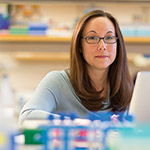Shelly Sakiyama-Elbert, PhD, has been elected to the Biomedical Engineering Society Class of 2013 Fellows.

Sakiyama-Elbert, professor and associate chair of biomedical engineering, was one of seven elected to the class. Fellows are selected for demonstrating exceptional achievements and experience in the biomedical engineering field and for their membership and participation in the society.
She will be formally recognized at the society’s annual meeting in September in Seattle.
Sakiyama-Elbert has become widely known for her groundbreaking work in tissue engineering techniques. Her research, funded by the National Institutes of Health, expertly blends biology, chemistry and biomedical engineering to focus on developing biomaterials for drug delivery and cell transplantation to treat peripheral nerve and spinal cord injuries.
At Washington University, Sakiyama-Elbert is a faculty fellow in the Office of the Provost and recently completed the Women’s Leadership Forum Certificate Program at Olin Business School. She also is a professor of energy, environmental and chemical engineering, and of surgery at the School of Medicine.
The School of Engineering & Applied Science at Washington University in St. Louis focuses intellectual efforts through a new convergence paradigm and builds on strengths, particularly as applied to medicine and health, energy and environment, entrepreneurship and security. With 82 tenured/tenure-track and 40 additional full-time faculty, 1,300 undergraduate students, 700 graduate students and more than 23,000 alumni, we are working to leverage our partnerships with academic and industry partners — across disciplines and across the world — to contribute to solving the greatest global challenges of the 21st century.